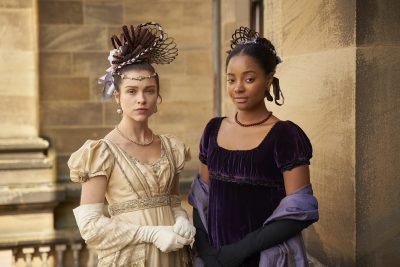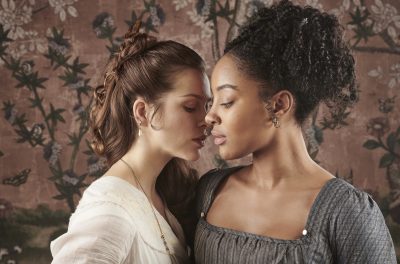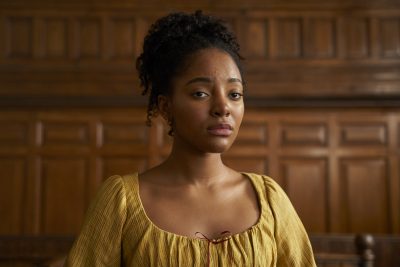Set against the dazzling opulence of Georgian London, The Confessions of Frannie Langton follows a young woman’s journey from life as a Jamaican plantation slave to the grand Mayfair mansion of a celebrated scientist and his glamorous wife.
When Frannie (Karla-Simone Spence – Blue Story, Wannabe) is ‘gifted’ by her owner to the Benhams as a maid, she finds herself trapped in a deeply troubled household and becomes the chief suspect in a double murder. This powerful period drama is adapted by Sara Collins from her award-winning novel and also features Sophie Cookson (The Trial of Christine Keeler) and Steven Macintosh (Lock, Stock and Two Smoking Barrels, Luther).
Karla-Simone Spence was interviewed about her role as Frannie Langton and we can’t wait to share the deets with you:
What attracted you to The Confessions of Frannie Langton?
“It’s an incredible story. I was really intrigued by Frannie’s journey. She’s an incredibly witty, resilient woman. As soon as I read the scripts I was like, ‘I have to play her.’ I really wanted this role.
“I poured everything into my final round of auditions. When my agent called to say they were offering me the role, I screamed and had to mute myself because I just went crazy. I was really happy. I had waited for this moment for a really long time and it was worth the wait.”

How would you describe this story?
“It’s a period drama, set in the 1800’s. It’s Frannie’s story and she wants the world to know what she went through from her own account. When Frannie arrives in England from Jamaica with John Langton (Steven Mackintosh) she is technically a free woman. She could run into this new world, but where would she go? Frannie is a survivor. She has made difficult decisions in order to survive. So in that moment she chooses to stick with the devil she knows. A choice that has led her to where we find her at the beginning of the show.”
Do people make assumptions about Frannie?
“In the show people assume many things about Frannie and the life that she has led. Including that she can’t read or write. But she has a great love of reading and for books. She can be the most intelligent person in the room but can’t always show it.”
“They assume that Frannie would be subservient, having been a former slave. She is not. Only when it suits her to be. They assume that her connection to Madame is an obsession that carries ulterior motives, but this is simply not the case. Frannie is young and hasn’t really experienced love before. She did eventually know who her mother was, but she never had that maternal bond. Frannie never felt that she was nurtured and looked after.”
“So when she discovers Madame (Sophie Cookson) it is such a breath of fresh air for her. She has never had a romantic connection with anyone. When she first meets Madame she feels this magnetic attraction, that she doesn’t quite understand. Initially, Frannie is very impressed with Madame’s literary taste. Madame is very forward in her thinking and voices her thoughts, just as Frannie does and Frannie admires that.”
“But in 1820’s England love between two women is a forbidden love. Society does not approve, but Frannie doesn’t care. She has always lived her life having to conform and being a certain way. Now she doesn’t want to hide anymore.”
How did you, Sophie Cookson and director Andrea Harkin approach filming the more sensitive scenes on set?
“It was really collaborative. We had an amazing intimacy co-ordinator, Adelaide Waldrop. We sat down and discussed what we were trying to convey with the intimate parts of their story. It was important for us to show that there was real love between them. It was a really comfortable experience.”

How would you describe Frannie and George Benham’s relationship?
“Frannie can’t stand George Benham. He is the reason for so much of the pain she has suffered in Jamaica. Yet he doesn’t see that. He believes he was doing things for the greater good, but Frannie soon learns that she can use George Benham to her benefit to get what she wants.”
What is Frannie accused of?
“Frannie is accused of the double murder of the woman she loves, Madame Benham, and George Benham (Stephen Campbell Moore) Madame’s husband. Frannie does not believe she has done it, but it doesn’t help that Frannie is found in bed with the body of her mistress and cannot remember much of the night in question.”
“This is a consequence of taking a great deal of Laudanum with Madame earlier in the evening. Laudanum is an opioid that was used as a form of medicine, but was often abused.”
How does this society look on men like George Benham compared to a black woman like Frannie?
“In 1820’s England, rich white men were in the highest level of society. Everyone listens to what they have to say and they are very well respected. No one was really interested in what a woman had to say, they had to fight to be seen. Now imagine being a Jamaican black woman, in a white world. There’s extra layers of oppression that one has to fight.”
Until relatively recently history was as written and told by men. Women’s history has often been lost because it was never written down and recorded?
“Frannie says to Madame, ‘Men write to separate themselves from the common history…women write to try to join it.’ and it rings so true. Madame tries to write her own biography, but can never be allowed to publish it. Women wanted to be a part of the story. But if there is no account of the lives they have led and stories that they have had to share, no-one is going to know what they went through.”
“George Benham is able write ‘his story’ and publish it. So years later all anyone will know is what he did from his own account and how he would like people to see him. But Frannie is not going to let anyone else tell her story. She wants us to know her real story, as told by her.”
How did you approach Frannie’s accent?
“I had a couple of sessions with a vocal coach named Joel Trill and then I went off on my own and created the voice that is Frannie’s. I am of Jamaican heritage, so I’m very familiar with the accent. But it would have been different in the 1800s. So I focused on creating a posh Jamaican accent and once I found her voice it was all I could hear. I love doing accents, because playing a character feels more immersive and less like myself.”
What does The Confessions of Frannie Langton look like on screen?
“The show is set in the Georgian era. One of the popular hairstyles back then was a high bun, which Frannie wears. The style back then included empire line dresses and corsets, which I enjoyed wearing as they helped me to understand how Frannie would have lived, how she carried herself and how she breathed.”

What was it like working with Sophie Cookson as Madame Benham and other cast members?
“I can’t imagine a better Madame to my Frannie. We filmed the love scenes towards the end of the shoot. It was nice to see Frannie being loved and I had a great time building that relationship with Sophie.”
“I enjoyed working with all of the cast to be honest, I feel very lucky to share this story with them. I remember the chemistry read I had with Patrick Martins, who plays Laddie Lightning and I instantly knew he was the one. I really enjoyed working with Patrick and can I just say Steven Mackintosh was also a dream to work with, despite our character’s difficult relationship, I had a great time with him on set!”
And director Andrea Harkin?
“Andrea has been a dream to work with. She trusted me completely with what I wanted to do with Frannie. There was never a time where I felt we were disagreeing about what should be happening in the story. I trust her vision and we make a great team!”
Did you meet Caelen, who plays young Frannie, or Kiera, who plays teen Frannie? “I saw Kiera briefly, she was busy on set. I could tell she was a natural! I got to speak with Caelen, we took some photos together, which was really sweet. The casting was incredible. I’m really glad that they were chosen to help tell the story of Frannie.”
Can you tell us about some of the filming locations?
“The locations were amazing and so beautiful. We filmed at massive mansions with huge lawns and gardens. The detail in the architecture was very impressive. I really liked the ceiling in the entrance of Duncombe Park.”
“We were filming all around Yorkshire and the crew did an amazing job at transforming the locations back in time. We filmed the court scenes at Dewsbury Town Hall and it was made to look like the Old Bailey.”
What might Frannie have been if she had been alive today?
“I have no doubt that Frannie would have been a published author. I imagine she would have travelled the world, maybe even had a family. She could have done anything she put her mind to.”
How do you reflect back on playing Frannie Langton?
“Sadly, I wasn’t shocked by anything that happens in the story. It was upsetting reading the script, reading the novel and just hearing everything Frannie had endured. That struck home with me because she has been through so much. I feel so deeply connected to her. I feel that Frannie is me and I am Frannie.”
“Frannie is not one of those characters that just fades away. She is one of those characters that bury into your soul and stay there in hibernation.”
“We went on so many emotional rollercoasters together. I’m grateful and honoured that I was able to play her. Her story is so rich and so much happens over the course of four episodes. It’s rare that a leading role is written for a woman like me. I’m just so happy that Sara Collins wrote this story and I was able to bring her to life.”
“I really want people to watch this show because I want them to meet Frannie. To fall in love with the woman that I fell in love with, despite her flaws. Just to hear her story, because she really wants people to hear it. I think she is worth the watch.”
The Confessions of Frannie Langton (a new and exclusive BritBox Original) can be streamed on Britbox.


